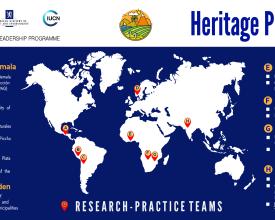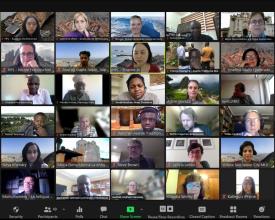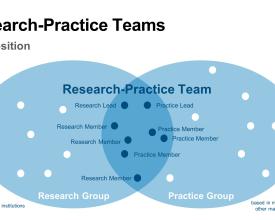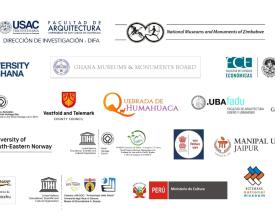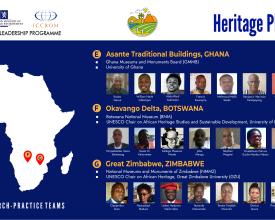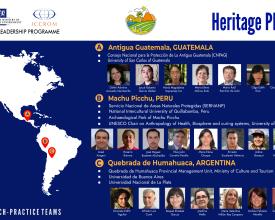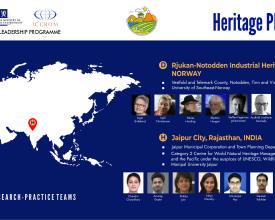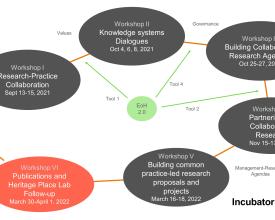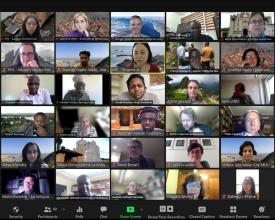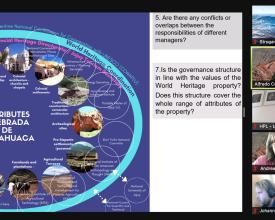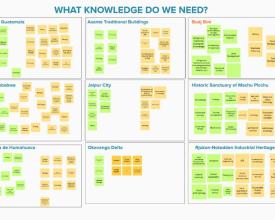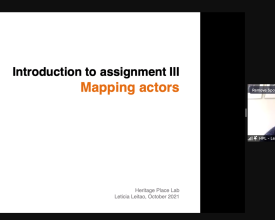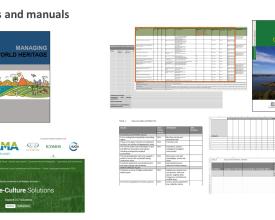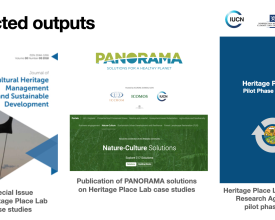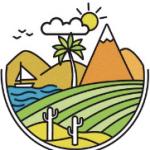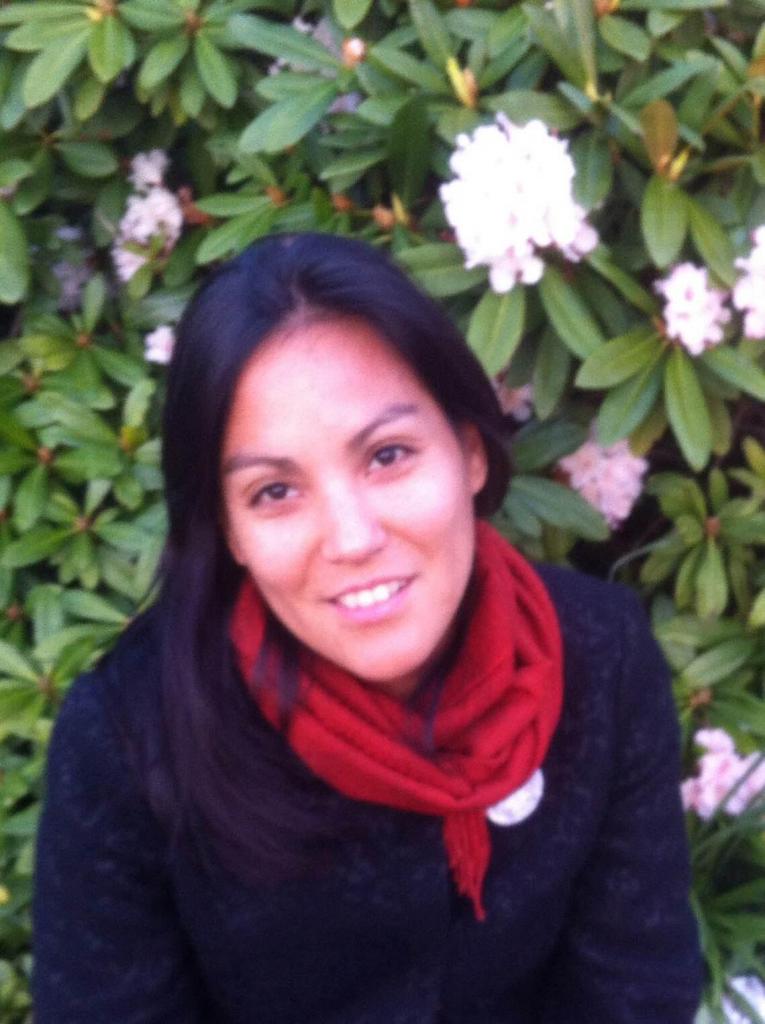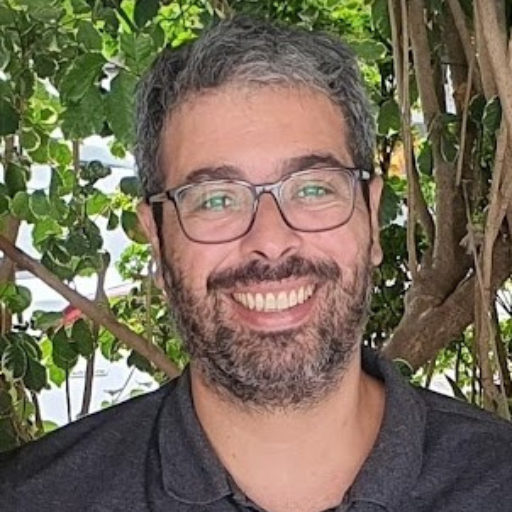
Heritage Place Lab, un lien entre la recherche et la pratique pour améliorer la gestion du patrimoine mondial
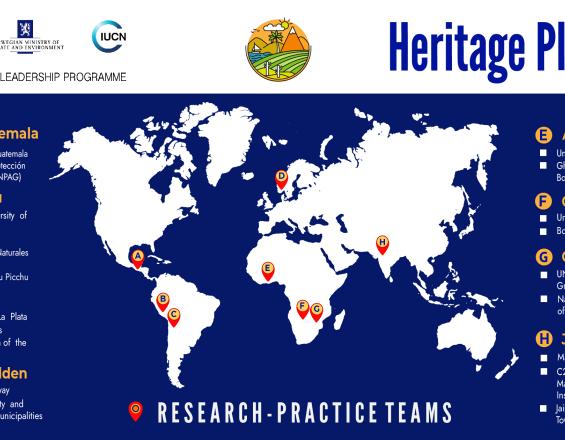
Le Programme de leadership du patrimoine mondial (WHLP) facilite les liens entre la recherche et la pratique afin de soutenir la gestion des sites du patrimoine mondial et l'élaboration de politiques en appliquant une approche fondée sur les lieux patrimoniaux dans un laboratoire de recherche et de pratique, le Heritage Place Lab (laboratoire des lieux patrimoniaux). L'intention du Heritage Place Lab est de fonctionner comme un incubateur de programmes de recherche axés sur la pratique pour des biens spécifiques du patrimoine mondial, mais aussi de servir un plus large éventail de biens confrontés à des problèmes similaires, en promouvant des projets de recherche dont les résultats peuvent avoir des retombées positives pour la gestion des sites et promouvoir des pratiques de gestion des sites qui peuvent façonner la recherche future. La phase pilote du Heritage Place Lab a consisté en six ateliers en ligne organisés sur une période d'un an. Au cours de ces ateliers, les gestionnaires de sites et les chercheurs ont travaillé en collaboration pour explorer les problèmes et les préoccupations liés aux lieux du patrimoine mondial qui peuvent être abordés par une recherche axée sur la pratique.
Contexte
Défis à relever
Le système du patrimoine mondial offre un espace d'échange entre les chercheurs universitaires et les praticiens, mais cette collaboration n'a pas été suffisamment et systématiquement entreprise. Le Heritage Place Lab vise à activer ces réseaux en relevant les défis suivants :
- Faiblesse des liens entre le monde universitaire et la gestion des sites ;
- L'absence ou l'insuffisance des échanges entre les chercheurs et les praticiens des domaines du patrimoine naturel et culturel ;
- Absence d'impact direct de la recherche sur le patrimoine sur la gestion des sites ;
- Peu de recherches portant sur les questions de gestion des sites ;
- Absence ou limitation des plates-formes de promotion de la recherche appliquée au patrimoine mondial ; et
- L'absence ou l'insuffisance de plates-formes pour promouvoir l'interdisciplinarité, la transdisciplinarité et les dialogues sur les systèmes de connaissances, y compris les connaissances autochtones et locales pour le patrimoine mondial.
Emplacement
Traiter
Résumé du processus
L'établissement de partenariats entre institutions a permis d'initier le processus Heritage Place Lab (BB1), afin d'engager les équipes de recherche-pratique dans la participation aux ateliers en ligne de l'incubateur (BB2) et dans la publication des résultats (BB4). L'évaluation de l'efficacité de la gestion en tant que travail collaboratif entre les chercheurs et les gestionnaires de sites (BB3) a permis de renforcer les partenariats et de développer les résultats.
Blocs de construction
Établir des partenariats entre les institutions de recherche et les autorités de gestion
Le Programme de leadership du patrimoine mondial (WHLP) a lancé un appel à candidatures pour des équipes de recherche-pratique souhaitant travailler sur des questions de gestion du patrimoine mondial en collaboration dans le cadre du laboratoire expérimental "Place Lab". Les équipes de recherche-pratique devaient être composées d'un groupe de chercheurs (2-4) et d'un groupe de gestionnaires de sites (2-4). Le groupe de recherche pouvait inclure des membres de la faculté, des étudiants post-doctoraux et des étudiants diplômés, basés dans une ou plusieurs institutions de recherche, couvrant les domaines du patrimoine culturel et/ou du patrimoine naturel. Le groupe de gestionnaires de sites peut comprendre 2 à 4 membres impliqués dans la gestion d'un bien du patrimoine mondial, qui peut appartenir à une ou plusieurs institutions (autorités de gestion, municipalité, communauté entre autres), et qui fait partie du système de gestion des sites du patrimoine mondial. Le PLMH encourage les équipes de recherche-pratique à travailler de manière interrégionale et au sein de groupes multidisciplinaires et interdisciplinaires, en considérant le genre et l'équilibre intergénérationnel comme des priorités. Les équipes de recherche-pratique devaient s'engager à travailler ensemble pendant toute la durée de la phase pilote du Heritage Place Lab et de ses activités de suivi (y compris entre les 6 ateliers en ligne de l'incubateur).
Facteurs favorables
- Les réseaux existants de recherche et de pratique du patrimoine mondial, en particulier ceux liés au WHLP, y compris ceux des organisations consultatives de la Convention du patrimoine mondial : Chaires UNESCO, forums universitaires, comités scientifiques internationaux de l'ICOMOS, commissions et groupes de spécialistes de l'UICN, et initiatives telles que le projet ICOMOS-UICN Connecting Practice et le Forum des gestionnaires de sites du patrimoine mondial ;
- L'intérêt des gestionnaires de sites et des chercheurs pour la recherche appliquée ;
- L'intérêt des praticiens du patrimoine pour les relations intersectorielles et internationales.
Leçon apprise
Lors des appels et des consultations avec les équipes de recherche-pratique potentielles, il est devenu évident que l'engagement dans un tel projet nécessiterait :
- Un soutien institutionnel de la part des institutions de recherche et des autorités de gestion ;
- un soutien financier potentiel pour garantir l'engagement des deux groupes au sein d'une équipe ;
- Produire des incitations spéciales pour les chercheurs, au-delà de l'aspect financier, telles que des publications scientifiques ;
- Produire des résultats concrets qui seraient utiles aux autorités de gestion, tels que le développement d'un programme de recherche qui pourrait être utilisé en conjonction avec les plans de gestion.
Ateliers en ligne de l'incubateur recherche-pratique
Le Heritage Place Lab a fonctionné comme un incubateur de programmes de recherche axés sur la pratique pour 8 biens du patrimoine mondial, en favorisant les canaux permettant à la recherche d'avoir un impact sur la gestion des sites et à la gestion des sites d'influencer la recherche grâce à la mise en œuvre de 6 ateliers en ligne de 3 sessions de 3 heures chacune, qui se sont déroulés sur une période de 7 mois. Au cours de ces ateliers, les questions relatives à la gestion des sites ont été explorées en collaboration, ce qui a permis aux chercheurs de tester des théories et des méthodologies avec des gestionnaires de sites travaillant sur le terrain. Les chercheurs ont eu accès aux biens du patrimoine mondial et ont acquis une compréhension approfondie des besoins locaux. Les gestionnaires de sites se sont familiarisés avec les méthodes de recherche et ont coproduit des programmes de recherche pour leurs sites du patrimoine mondial. Plus de 30 intervenants de différents horizons, y compris des chercheurs, des praticiens, des responsables et des experts internationaux, ont apporté leur contribution sur des sujets spécifiques développés dans chaque atelier. Les animateurs ont fourni des éléments de réflexion et un retour d'information aux équipes sur l'élaboration des missions qui ont conduit à la production d'agendas de recherche.
Facteurs favorables
- En raison de la pandémie de COVID, le WHL est passé à des activités en ligne, ce qui a permis d'impliquer des chercheurs, des praticiens et des experts du monde entier.
- L'environnement en ligne était déjà familier à la plupart des participants au projet, y compris l'utilisation d'applications interactives qui ont permis des échanges plus étroits.
Leçon apprise
- Même si les participants étaient habitués à l'environnement en ligne, la coordination des fuseaux horaires a posé des problèmes (trop tôt pour certains, trop tard pour d'autres) et, par conséquent, ces activités pourraient être mieux mises en œuvre au niveau national ou régional.
- Des problèmes techniques liés aux connexions Internet et à l'accès aux appareils ont été rencontrés dans chaque atelier, limitant la participation active de certaines personnes impliquées dans le projet.
- L'absence de connexion physique a constitué un défi, mais le cadre en ligne a permis d'autres types d'échanges et de connexions et d'élargir le réseau (davantage de personnes ont pu être impliquées, les équipes ont pu organiser leur travail dans des salles de discussion et des salles de classe virtuelles).
Évaluer en collaboration l'efficacité de la gestion des biens du patrimoine mondial
Le Heritage Place Lab a testé des concepts et des outils développés dans le cadre du WHL ou en collaboration avec lui, notamment le cadre de connaissances pour la gestion du patrimoine mondial, la boîte à outils Enhancing Our Heritage Toolkit 2.0 (EOH 2.0), ainsi que la base de données d'études de cas de PANORAMA Nature-Culture Community (https://panorama.solutions/en/portal/nature-culture). Dans le but de développer des programmes de recherche axés sur la pratique pour les biens du patrimoine mondial, le Heritage Place Lab a proposé que chaque équipe de recherche et de pratique travaille sur des missions entre les ateliers qui ont été présentées par la suite. La séquence des missions a été conçue pour alimenter la production des programmes de recherche pour chaque bien du patrimoine mondial, en utilisant les outils 1, 2 et 4 de la boîte à outils EOH 2.0 qui vise à évaluer l'efficacité de la gestion. Les équipes ont évalué la compréhension commune des valeurs et des attributs, des accords de gouvernance et des facteurs affectant leurs sites patrimoniaux, ce qui a permis d'identifier les problèmes de gestion et les priorités de recherche.
Facteurs favorables
- Le WHLP développe actuellement un certain nombre de manuels et d'outils pour soutenir la gestion des biens du patrimoine mondial. Ceux-ci ont pu être testés pendant la phase pilote du Heritage Place Lab.
- L'implication dans le projet des auteurs de ces manuels et outils, ainsi que des praticiens qui ont appliqué ces outils sur leurs sites, a facilité le processus.
Leçon apprise
- Les manuels et les outils ont été créés à l'usage des gestionnaires du patrimoine mondial et d'autres lieux patrimoniaux, et ils étaient plus difficiles à comprendre pour les chercheurs. Cependant, l'utilisation de ces outils a aidé les chercheurs à mieux comprendre la gestion et à identifier les besoins en matière de gestion et de recherche sur la base des problèmes rencontrés sur le terrain, en se rapprochant davantage des sites.
- Le travail de collaboration entre les chercheurs et les gestionnaires de sites évaluant l'efficacité de la gestion a été fondamental pour renforcer les partenariats entre la recherche et la pratique et a permis de lancer de nouveaux projets et plans potentiels au sein des équipes.
Publication des résultats
Afin d'engager les équipes de recherche-pratique dans le Heritage Place Lab sur une base volontaire, il était nécessaire d'établir la production de résultats tangibles qui seraient utiles pour les individus, les institutions et les lieux patrimoniaux. Le Heritage Place Lab a proposé de développer et de publier les programmes de recherche résultant du processus, la publication d'un numéro spécial sur le Journal of Cultural Heritage Management and Sustainable Development (Emerald) qui est une étape importante pour les universitaires, et la production de solutions Nature-Culture à publier sur PANORAMA.
Facteurs favorables
- Le WHLP gère la communauté PANORAMA Nature-Culture ;
- L'ICCROM, principal partenaire de mise en œuvre, est lui-même une institution de recherche et dispose d'une publication interne ;
- Partenariat établi avec le Journal of Cultural Heritage Management and Sustainable Development (Emerald) pour le développement du numéro spécial.
Leçon apprise
Le processus de publication des résultats s'ajoute au processus des ateliers en ligne de l'incubateur, il est donc important de calculer le calendrier des deux processus, ainsi que de compter avec les ressources pour le travail éditorial et le suivi. Ces éléments doivent être établis avant de commencer la mise en œuvre.
Impacts
Le Heritage Place Lab a permis
- L'établissement ou le renforcement de partenariats entre les institutions de recherche et les autorités de gestion des sites ;
- La mise en réseau de chercheurs et de gestionnaires de sites dans 4 régions du monde et 8 biens du patrimoine mondial, y compris des villes historiques, des zones protégées, des sites archéologiques, des paysages culturels, un patrimoine bâti vernaculaire et des sites industriels ;
- Le développement d'agendas de recherche axés sur la pratique pour les biens du patrimoine mondial ;
- Le test et la formulation d'un modèle de collaboration entre la recherche et la pratique qui peut être étendu à d'autres sites du patrimoine.
Bénéficiaires
Les acteurs du système du patrimoine mondial, y compris les chercheurs, les gestionnaires de sites, les jeunes, les communautés locales, les organisations consultatives de la Convention du patrimoine mondial, les praticiens du patrimoine.

